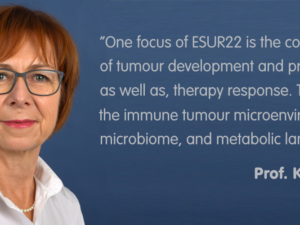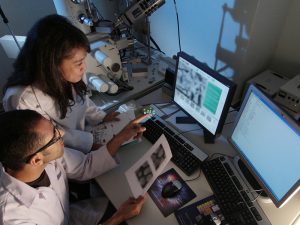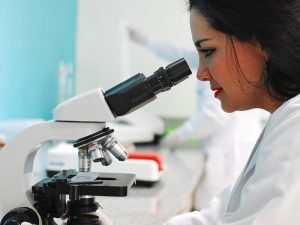Participate in riveting, interdisciplinary discussions on vital clinical and research topics at the upcoming 24th Meeting of the EAU Section of Urological Research (ESUR17). The meeting will focus on enhancing the clinicians’ knowledge on research strategies and the researchers’ cognizance of urological challenges.
“ESUR17 is a unique and distinguished platform to meet and collaborate with researchers and clinicians from different urological fields. These international and esteemed experts will deliberate on important clinical questions with varied clinical and research points of view,” said ESUR Chair Prof. Dr. Kerstin Junker (DE) of the Universitätsklinikum des Saarlandes.
This meeting is organised with the support of Meeting Chair Prof. Yves Allory (FR) of Institut national de la santé et de la recherche médicale (Inserm), and in collaboration with the EAU Section of Urological Pathologists (ESUP) and Association pour la Recherche sur les Tumeurs de la Prostate (ARTP).
Hot topics at ESUR17
Tumour heterogeneity and the implications for therapy with a focus on bladder cancer will be one of the main topics of this year’s meeting. “As it is getting more widely accepted that tumour microenvironment plays an important part in tumour development and progression, one of the major topics at ESUR17 will be tumour complexity and its role concerning tumour progression and therapy. Prominent speakers will discuss the role of nerves and immune cells for tumour progression and drug resistance,” stated Junker.
Furthermore, different in-vitro and in-vivo model systems that reflect tumour complexity will be presented during the meeting. Junker also mentioned that there will be an examination of the technical and ethical aspects of the Clustered Regularly Interspaced Short Palindromic Repeats (CRISPR) system.
Junker added, “DNA repair mechanisms and defects in the related genes play an important role in disease development. Therefore, we will critically examine the role of DNA repair genes for chemotherapy response and therapeutic targets in urological cancers.”
Current major challenges in urological research
According to Junker, the current major challenges in urological research are identifying the most significant clinical questions and bringing the results from research into clinical practice. “To resolve such challenges, we as researchers and clinicians need open communication, close contact and mutual understanding.”
Junker stated that presently, one of the most relevant topics is understanding the high diversity of tumour subtypes, which is mainly possible through molecular characterisation. “This is important for clinics because subtypes are characterised by different prognosis. Also, in the era of molecular targeted therapies, it is essential to know the targets and to select the patients individually for systemic therapies.”
Another major challenge in urological research is the development of biomarkers. “Many potential biomarkers for diagnosis, prognostic evaluation and therapy response prediction have been identified. Now, they have to be validated in clinical practice. We need defined criteria similar to therapeutic studies. Liquid biopsies are very promising in this regard,” stated Junker.
Breakthroughs in the coming decade
Junker said that the focus in the coming years should be individualised therapy for patients. “The use of biomarkers is key. The molecular and cellular backgrounds, especially of metastasis, will be deciphered in a more complex way. This includes cell-to-cell communication. Then based on these, new therapeutic options will be identified,” Junker concluded.





